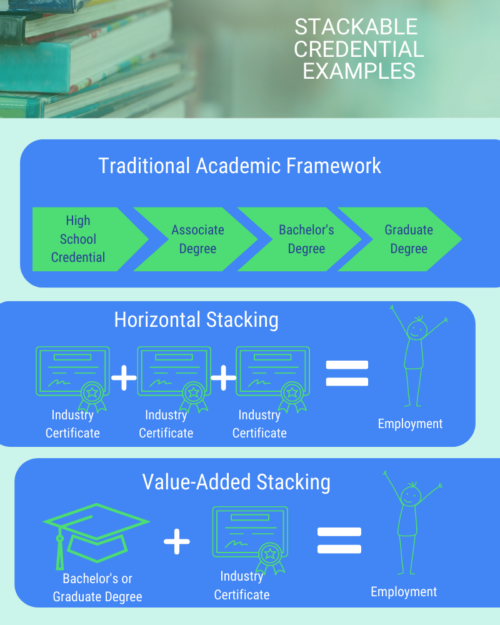By Julianne Hill, Digital Skills Program Manager, Goodwill Industries of Michiana, Inc.
Hello readers! As I embark on this writing journey, I am filled with overwhelming excitement and feel a tremendous sense of honor to have the opportunity to share my personal experiences, expertise, and insights. First, please allow me to introduce myself. My name is Julianne Hill. I am the Digital Skills Program Manager for The Academy @ Goodwill (Career and Technical Education Department).
I started my Goodwill journey as a job seeker. In June 2017, I was unemployed and searching for a job that fit my skills. I supported myself with my income and knew unemployment would not cover the bills. It was a scary time. But, as soon as I walked into the Goodwill office, the staff put me at ease and gave me what I needed to seek employment successfully. I was so impressed with the services offered that I wanted to be a part of it. I was encouraged by Goodwill staff to pursue a bachelor’s degree, so that is what I did. I worked a temporary job until November 2017, when an Employment Specialist job became open in my area. So, in a way, I am a Goodwill success story.
There will be three blogs on this particular topic. This first one will explain stackable credentials and how they can benefit a job seeker or someone looking to advance their career. The second and third blogs will go into detail about the nine Google Career Certificates in both IT and Business.
What are stackable credentials?
One of the easiest ways to think about stackable credentials is by comparing them to building blocks. Each block represents a credential. A credential is a formal document that confirms the validity of an individual’s skills, achievements, or knowledge on a particular topic.
Credentials are commonly awarded after successful completion of a training program. Credentials may come in many forms. However, I most often deal with badges, certificates, and certifications.
I commonly hear the words certificate and certification used interchangeably. I will admit that I did not even understand the difference between them at one point. So, let us break it down. A certificate is generally awarded after the completion of a training program. Certifications typically involve a more involved assessment process and may signify expertise at a higher level. The certifications that I have been involved in most recently have a final exam that is timed and proctored, meaning that someone is overseeing the test to make sure that no outside materials are used and that it ends at the correct time.

What are the benefits of stackable credentials?
Now that we have established what credentials are, we need to talk about what it means to stack them. Let us go back to the building block analogy, where each block represents a credential (certificate, certification, badge, etc.). When these blocks are stacked, it creates a solid foundation of proven skills and knowledge. This foundation makes the individual a solid candidate in the employment process. As an employer and as someone who reviews resumes often, I am excited and, dare I say, ecstatic to see this type of education listed. I believe in being a lifelong learner; career certificates are a great way to achieve this.
A couple of the most positive features of stackable credentials are their flexibility and cost-effectiveness. They allow the learner to customize their learning journey according to their goals. This is the point where I typically caution people. Going out and spending time and money on random credentials does not necessarily make you more employable. It takes strategic planning to find the right stackable credentials for your field of interest and the ones that give you the best return on your time and money investment. Take the time to do the industry research or ask for help from someone knowledgeable about the industry you are pursuing.
Another benefit to stackable career certificates is the time commitment. It typically takes less time to complete a career certificate than it would be to earn a degree. In addition, career certificate programs usually provide targeted industry-relevant skills development, thus increasing your chances of standing out in the job market.
If one of your goals is to pursue a degree, completing a career certificate can be a pathway in this direction. It may help you develop study and time management skills to prepare you for a successful educational career. Some higher education institutions even allow individuals to transfer their completed certificates towards credits. Some educational institutions even encourage their students to pursue career certificates as they are also working on their degrees.
Overall, stackable career certificates can be the building blocks to a better future. They create a solid foundation for success and make the individual stand out in the employment process. In addition, these career certificates can be part of a customized learning journey that will take less time to complete, be more cost-effective, and potentially lead to a higher degree.
If you are considering working on career certificates or certifications, contact the staff at your local Goodwill. Goodwill has many career centers in various areas with a team that can help guide you through the process of creating your learning journey.
Now that we have covered the basics of what stackable credentials are and how they are beneficial, we can get to an even more exciting topic: Google’s career certificates. I love what these programs have to offer and believe you will too. So please stay tuned for the upcoming blog covering Google’s IT Career Certificates.
Best wishes on your career journey. Goodbye for now!




